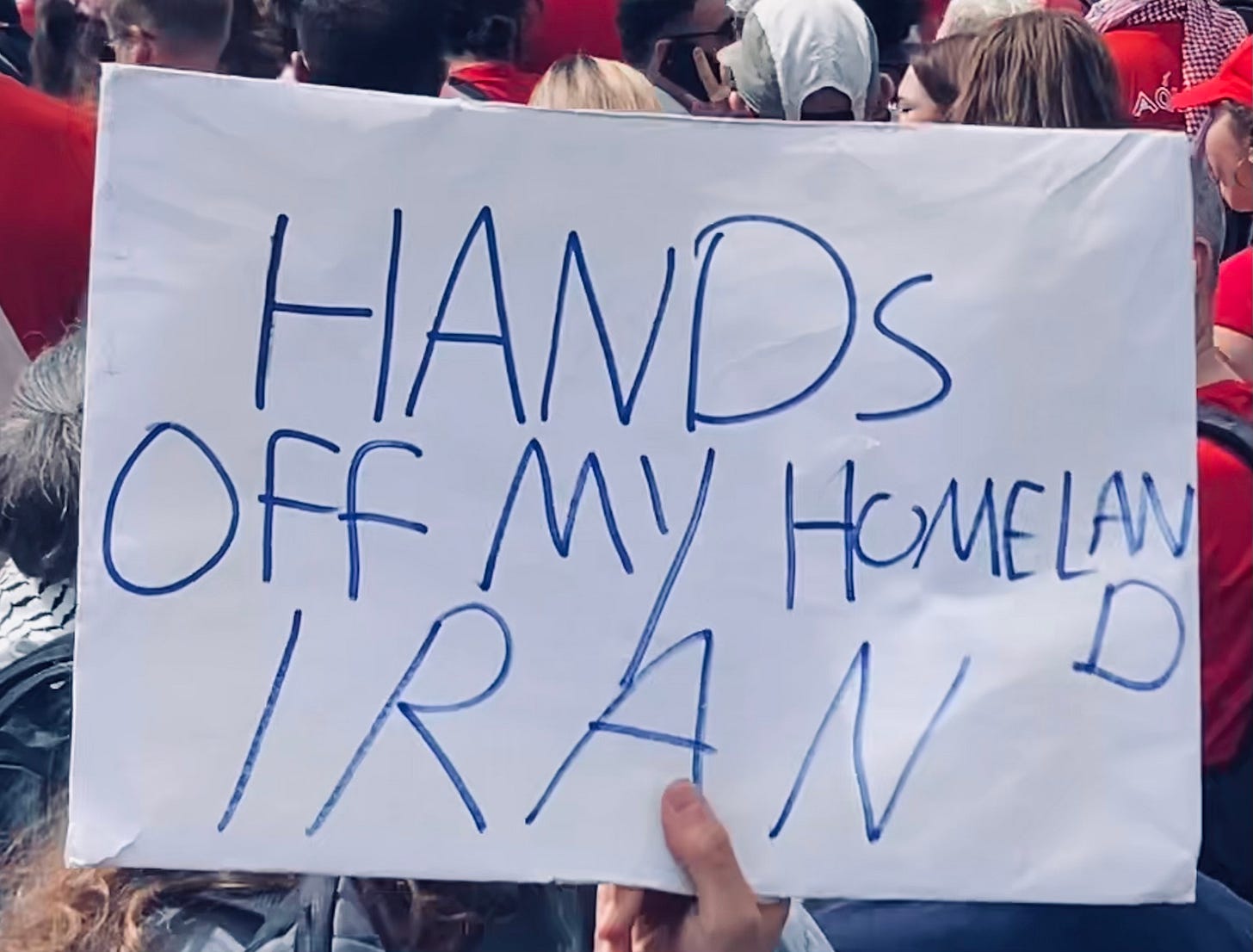Dreaming of Regime Change in Tehran? Time to Wake Up
The US-Israeli war on Iran has opponents of the Islamic Republic dreaming of a regime change in Tehran. But Iranians deserve better.
The US-Israeli war on Iran has opponents of the Islamic Republic dreaming of a regime change in Tehran. After initially attacking Iran’s military defenses and nuclear facilities, over the past week, Israel expanded its target list to include transportation and communications infrastructure, industry, and security forces. Hundreds of strikes have killed more than 400 people and wounded 3,500. Even before joining Israel’s war by dispatching American warplanes to bomb Iranian nuclear facilities, US President Donald Trump signaled his intentions. “We now have complete and total control of the skies over Iran,” the president wrote on social media, the “we” underscoring both the closeness of US-Israeli ties and the importance of American military hardware for Israel’s war machine.
Calls for regime change have followed close on the heels of Israel’s military success. Prime Minister Benjamin Netanyahu told the media that Israel’s operation “could certainly” result in the overthrow of the Iranian ruling clerical establishment, led by Supreme Leader Ayatollah Ali Khamenei. Addressing the Iranian people directly, Netanyahu declared, “the time has come for you to unite around your flag and your historic legacy by standing up for your freedom from an evil and oppressive regime. It has never been weaker.”
Although in the past, Trump frequently criticized U.S. nation-building efforts, in recent days he appeared to agree with his Israeli counterpart. “UNCONDITIONAL SURRENDER!” the president wrote on social media.
To be sure, millions of Iranians chafe against their government’s repression. But they also understand the risks of external interventionism.
It’s time for the regime change dreamers to wake up. Less than a quarter-century ago, in the aftermath of the 9/11 terror attacks, the George W. Bush administration naively believed that ousting Iraqi dictator Saddam Hussein would lead to a stable, democratic Iraq. Instead, the US invasion elicited a costly insurgency, vicious sectarian violence, and lasting regional upheaval that took hundreds of thousands of lives. Thanks to Trump, the United States is even less prepared to promote democracy abroad today. As part of his “America First” agenda, the president has stopped funding almost all U.S. government efforts to support democracy, human rights, and press freedom abroad, including the National Endowment for Democracy, the United States Agency for International Development (USAID), and Voice of America.
Correspondingly, Israel’s drive for regional hegemony is antithetical to political stability, let alone democracy. In Gaza, since the October 7, 2023 Hamas attacks, Israel has killed tens of thousands, displaced 90 percent of Gaza’s population, and, by blocking shipments of food and medicine from entering Gaza, created a humanitarian nightmare. Netanyahu has prolonged the war on Gaza as a strategy to hold his political coalition together while extending Israel’s regional power in an arc of destabilizing violence: crippling Hezbollah in Lebanon, destroying stockpiles of weapons in Syria, and now, by bombing Iran, pushing the possibility of U.S. and Iranian nuclear negotiations off the table.
To be sure, millions of Iranians chafe against their government’s repression. But they also understand the risks of external interventionism. In 1953, the U.S. orchestrated a coup against the Iranian Prime Minister Mohammad Mosaddegh. For the next quarter-century, successive U.S. presidents supported the authoritarian regime of Shah Mohammad Reza Pahlavi. The Shah was corrupt and autocratic, and SAVAK, the regime’s secret police force, was renowned for its brutality. “Alleged methods of torture include whipping and beating, electric shocks, [and] the extraction of nails and teeth,” the human rights organization Amnesty International reported in 1976, in a list that went on to include even more grotesque violations. Such state-sanctioned violence fueled the 1979 Iranian Revolution, which initially drew support from across Iranian society before devolving into a strict theocratic government that quickly racked up its own depressing record of human rights violations at home and abroad.
Today, many Iranians yearn for change. But Israeli and American bombs won’t bring the transformation they seek. As Israel’s attacks pummeled sites across Iran, Reza Pahlavi, the son of the deposed monarch, stepped into the limelight. “The ultimate solution is regime change,” the U.S.-based Pahlavi told the BBC. “Now, we have an opportunity, because this regime is at its weakest point.” Israeli Minister of Diaspora Affairs Amichai Chikli subsequently posted a picture of himself shaking hands with Pahlavi. “Soon in Tehran,” he wrote on X.
It is too early to tell whether Iran’s government will fall. But one thing is clear: Iranians deserve better.



This is a good argument; I mostly agree, especially re: risks of escalation. But I think I'll take the other side of this bet anyhow.
The key difference is that there are no boots on the ground this time by either Israel or the United States. The approach is way more hands-off against a weak regime (since they are basically at Israeli mercy at this point), and popular dissatisfaction is widespread. I’m not saying regime change is guaranteed to work out, but I do think the odds of a collapse driven by internal pressure, rather than imposed externally, feel a lot higher this time.